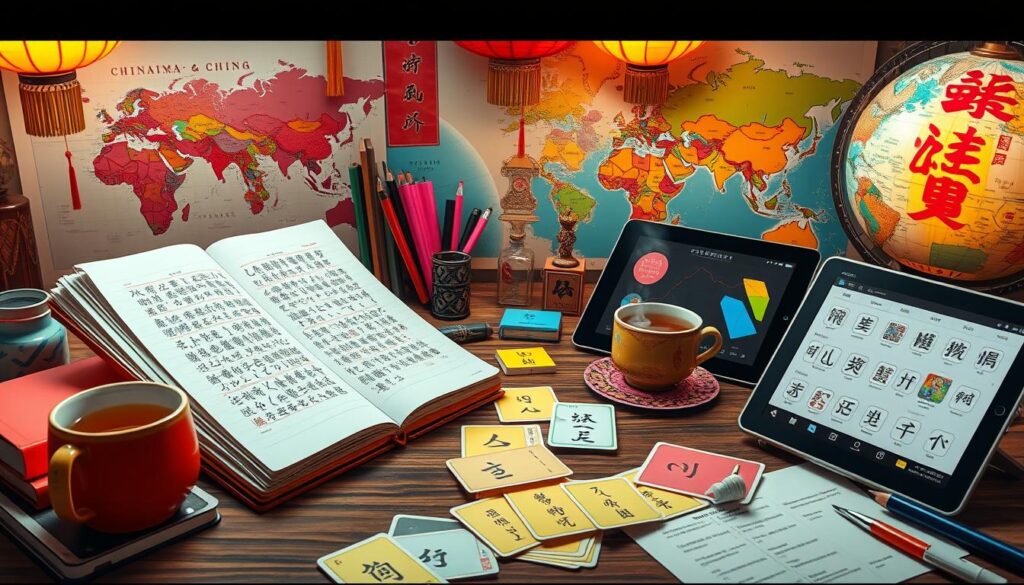Starting to learn a new language often leads to debates about which is harder, especially when deciding between Mandarin and Japanese. When we dig into the details of language learning, the question “is Mandarin or Japanese easier to learn?” often comes up. This answer isn’t easy because it depends on your own background and what you’ve been through.
Many English speakers are drawn to Japanese, thanks to its deep stories, film history, and the magical world of anime and manga. On the other hand, some people love the beauty of Mandarin’s tones and find joy in practicing them. They enjoy learning through classes or by making friends who speak Mandarin.
Considering money, some are attracted to how affordable it is to learn in China. Yet, others are fascinated by the unique way Chinese characters are pronounced. In contrast, the Japanese writing system, with Hiragana, Katakana, and Kanji, presents a rich cultural journey. Despite being hard, some learners cannot stay away.
For those undecided, the relative ease of learning Chinese might make them lean towards it. Yet, Japan’s modern culture pulls them in the other direction. Community feelings about this show a split. Many choosing Japanese for its connection to their favorite anime shows.
The key point in deciding between Mandarin and Japanese may come down to what inspires you. If the musical tones of Mandarin call to you, or if Japanese’s distinct pitch catches your ear, follow that passion. Let it lead you on this adventure of learning.
In the end, the shared roots in Chinese characters could link the languages, making learning one helpful for the other. So, will you walk under the bright lights of Tokyo or beside the Great Wall? Whether it’s Mandarin or Japanese, choose with joy. Every character you learn and phrase you speak takes you closer to a bigger world of knowledge and connection.
Understanding the Fundamentals of Mandarin and Japanese
Exploring Mandarin and Japanese begins by looking at their unique beginnings and ways of writing. Mandarin is part of the Sino-Tibetan family. It mainly uses monosyllabic, tonal sounds with Hanzi characters. Japanese uses three types of scripts—Hiragana, Katakana, and Kanji. Each has a special role, making Japanese quite complex.
Linguistic Roots and Writing Systems
Mandarin comes from a deep linguistic background. It uses simplified and traditional Hanzi characters, which are symbols for words or phrases. This is simpler than Japanese Kanji. A single Kanji character can mean up to 13 different things, showing how complex Japanese can be.
Grammatical Structures and Complexity
Mandarin grammar seems easier for learners because it lacks verb changes and tense differences. This is somewhat like English, despite the tonal sounds. Japanese grammar is more complicated. It has various verb forms and levels of politeness. This makes learning Mandarin or Japanese challenging.
The Phonetic Aspects of Mandarin and Japanese
The sounds of these languages add to the challenge. Mandarin uses 4 tones to change meanings. This is hard at first, but gets easier. Japanese isn’t tonal but has a pitch accent. This can subtly change meanings, making it sophisticated.
Knowing these key differences helps learners understand the difficulty levels of Mandarin and Japanese. Both languages are intriguing yet tough to master.
Is Mandarin or Japanese Easier to Learn?
Choosing between Mandarin or Japanese depends on your language learning interests. Both are in Category 5 of difficulty for English speakers, showing they’re quite challenging. Each language offers unique challenges and rewards.
Mandarin, spoken by most people worldwide, might be simpler for those who like easier grammar. It has no conjugations, plurals, or articles. But, Mandarin’s tones add complexity to its pronunciation. With practice, these tones can become more natural.
Japanese, on the other hand, doesn’t use tones, which might be easier for starters. Its pitch accent changes the nuance rather than the meaning. Yet, learning to read Japanese is hard due to its over 80,000 kanji characters, 3,500 of which are commonly used.
Deciding which language is simpler, Mandarin or Japanese, involves looking at various factors. A table below shows features that could influence your choice:
| Feature | Mandarin | Japanese |
|---|---|---|
| Grammatical Complexity | Simple | Complex |
| Pronunciation Challenge | Tones | Pitch Accent |
| Writing System | Characters | Kanji, Hiragana, Katakana |
| Global Speakers | Approx. 1.117 Billion | 130 Million |
| Learning Hours for Fluency (Estimated) | 2200 Hours | 2200 Hours |
Deciding on the easiest language to learn Mandarin or Japanese is up to how you prefer to learn. Both China and Japan’s languages open doors to deep cultural knowledge and opportunities.
Analyzing the Challenges of Mandarin Language Difficulty
Choosing between learning Mandarin vs Japanese means looking at each language’s challenges. Mandarin is known for its mandarin language difficulty. The main reason is its complex tones and sounds, which are very different from English.
The big challenge in Mandarin is its tones. There are four main tones plus one neutral tone. Each tone can change a word’s meaning. For those new to tonal languages, this can seem very tough. Also, Mandarin has sounds not found in English. This makes it hard for English speakers to pronounce correctly.
Let’s look into some key facts:
| Fact | Detail |
|---|---|
| Native Speakers | Mandarin Chinese has over 1 billion native speakers, making it the most spoken first language in the world. |
| Difficulty Rating | Chinese ranks as a highly difficult language for English speakers. This is because of its complex writing and tonal nature. |
| Economic Importance | Knowing Chinese is crucial for jobs in international trade, engineering, and supply chain management. This need is due to China’s huge manufacturing industry. |
| Global Influence | In 2019, over 100 million international tourists went to China. This shows China’s cultural and economic importance. |
| Salary Implications | Teaching English might pay more in China, but Japan has better working conditions. |
Learning Mandarin can be tough, but many do it because it’s becoming very important globally. If you want a career in international trade or tech, knowing Mandarin can really help. A recent study says there’s a high demand for Chinese and Japanese language skills. This is true across business, government, and nonprofits, showing how important these languages are worldwide.
In short, learning Mandarin has its hard parts, like the tones and sounds. Yet, knowing the language can open many doors in different careers. Thinking about these points can help you choose between learning Mandarin vs Japanese.
The Japanese Language Complexity: Is It More Formidable?
Learning a new language comes with its unique hurdles. When you look at Japanese, it’s clear why many find it hard. It has many features that make it a tough nut to crack, especially when you compare learning Mandarin vs Japanese.
Prosody and the Concept of Pitch in Japanese
Japanese has a pitch accent system, unlike Mandarin’s four tones. This system changes word meanings with rising and falling pitches. Take ‘hashi’ for example; it can mean ‘bridge’ or ‘chopsticks’ based on its pitch. Though it seems simpler than Mandarin’s tones, the pitch in Japanese adds a tricky layer. Learners must catch slight pitch changes to speak correctly.
Kanji Learning Curve: A Barrier or a Stepping Stone?
Kanji in Japanese writing comes from Chinese script. There are over 2,000 kanji for daily use, presenting a big learning curve. Yet, this isn’t just a hurdle. For those who know Chinese writing, Japanese kanji can help. Over half of Japanese words come from Chinese, making the journey easier for them.
Grammatical Simplicity: Do the Lack of Verb Conjugations Make a Difference?
Japanese grammar is complex, unlike the simpler structure of Mandarin. It has many rules, including the use of particles and ‘Keigo’, a respectful language form. Its sentence structure uses a subject-object-verb order. But, not all is complicated. For example, Japanese doesn’t use verb conjugations as much. This makes it simpler than English and other languages in one aspect.
In the end, Japanese’s kanji, and how it sounds, makes it tough yet rewarding to learn. Comparing learning Mandarin vs Japanese shows each has its own challenges. But, overcoming these adds to your language skills in valuable ways.
Deciding Which Language to Learn: Factors to Consider Beyond Difficulty
Choosing between Mandarin and Japanese involves more than just the mandarin vs japanese difficulty level. Each language can offer you unique benefits. This depends on your goals and interest in their cultures.
Mandarin Chinese is spoken by over 1.3 billion people worldwide. It can open doors to business and cultural experiences. If you’re into Chinese history or areas where Mandarin is key, learning it could be very useful. Understanding Mandarin not only lets you communicate with many people but also deeply explore an ancient civilization.
If you’re more interested in Japan’s tech, entertainment, or arts, Japanese might be better. It has around 125 million native speakers. Learning Japanese lets you dive deep into its culture and view its tech achievements up close. It’s great if you love Japanese manga, anime, or tech innovation.
Also, when you choose between Mandarin and Japanese, think about their linguistic aspects as mentioned in this comparative analysis of Chinese and Japanese. Mandarin has its tonal challenges but simpler grammar. Meanwhile, Japanese offers smoother pronunciation. However, its writing and honorifics system are complex.
| Language | Total Speakers | Learning Time (weeks) |
|---|---|---|
| Chinese (Mandarin) | 1.3 billion | 88 |
| Japanese | 125 million | 88 |
In the end, your choice to learn Mandarin or Japanese should match your goals and interests. It’s more than wrestling with the mandarin vs japanese difficulty level. It’s about connecting to new experiences, seeing different perspectives, and growing personally and professionally.
Embracing the Journey of Language Learning: Mandarin vs. Japanese
Starting to learn a new language is a fascinating journey. It combines learning words with diving into a new culture. When looking at language learning comparison between Mandarin and Japanese, both offer great benefits. Mandarin, spoken by over 1.3 billion people, opens doors to a rich culture and job opportunities in international business, technology, and more. When choosing which language is simpler, Mandarin or Japanese, think about the culture that interests you most for your future growth.
Learning Mandarin is valuable for those eyeing East Asian markets. China’s influence is huge in finance and trade, having the world’s second-largest GDP. Knowing Mandarin lets you communicate globally and shows an appreciation of Chinese culture. The challenge of mastering its four tones and understanding China’s history, from the Great Wall to Confucian philosophy, is enriching.
Japanese language and culture are also captivating. There are over 127 million native Japanese speakers. Japan is a major economy, leading in auto, electronics, and fashion industries. Japanese is unique with its three writing systems and levels of politeness. For those fascinated by Japan’s mix of traditional and modern, learning Japanese is enticing. Choosing between language learning comparison Mandarin vs Japanese depends on your interests. Your passion and deep dive into the language make the learning journey worthwhile and enjoyable.


